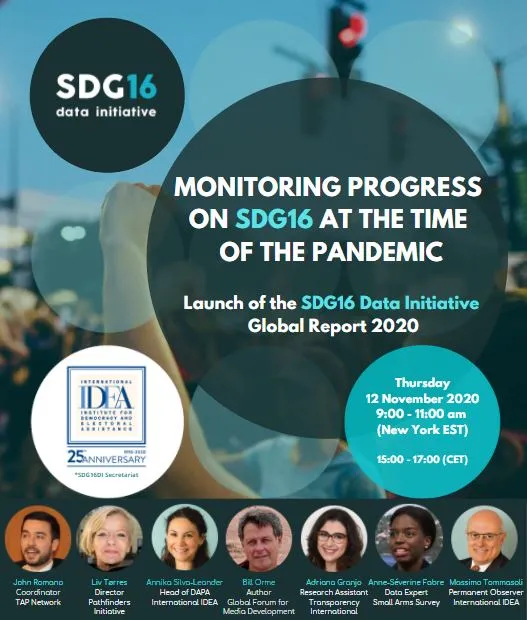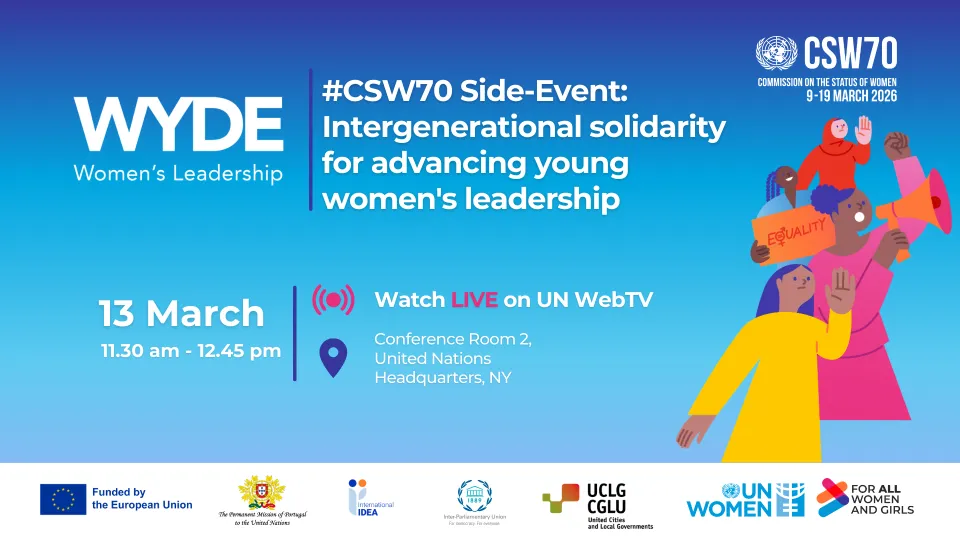Monitoring Progress on SDG16 at the Time of the Pandemic: Launch of the SDG16DI Global Report 2020

Members of international organizations with expertise in areas concerning global violence, corruption, access to information and the collection and interpretation of data, gathered on 12 November for the virtual launch of the fourth annual SDG16 Data Initiative Global Report to discuss and assess progress on the implementation of SDG16, on peaceful, just and strong institutions, at the time of the pandemic.
Permanent Observer for International IDEA to the United Nations, Massimo Tommasoli, introduced the conversation on the advances related to the SDG16, as well as its current challenges at the time of the COVID-19 pandemic. The virtual meeting was intended as the launch of the SDG16 Data Initiative Global Report 2020, and as a platform to continue the conversation on the advances around SDG16 and the data gaps that still exist in the task of assessing its progress. The Global Report provides resources to help understand progress on the SDG16 targets and offers recommendations on how to implement the right changes and adjustments based on reliable data. “We need data to measure what we are doing,” stated Pathfinders Initiative Director, Liv Tørres, and “we have to be transparent and respect the data, even when we don’t like it.”
“We live in very stressful times, and there is a need for good and transparent data—especially now that data is being twisted in many ways,” added John Romano, Coordinator of the Transparency, Accountability & Participation (TAP) Network, also highlighting the importance of reliable and clear data that can be understood by everyone, now more than ever. Research Assistant from Transparency International Adriana Fraiha Granjo, also added that “trust is crucial for democracy" and that data should be available for everyone—as a public good. Liv Tørres also stressed the importance of trusting information to safeguard democracy, a major issue in the US during the recent 2020 elections. On the same line, John Romano warned about the danger of social media and polarized information: “Social media are enabling and encouraging the spread of disinformation,” Mr Romano added, “because we only see the information we want to see.” People are not able to see other perspectives nowadays, and that is the biggest challenge when it comes to freedom and independent information.
The COVID-19 clearly has an impact on how data is being collected, as well as a direct impact on the issues that the SDG16 seeks to measure, such as domestic violence, suppression of information, and governments limiting human rights, among others. Data Expert for Small Arms Survey, Anne-Séverine Fabre, pointed out how the pandemic could have adverse impacts on armed violence (e.g., domestic violence), and how it could undeniably impact women more heavily. Along the same lines, Annika Silva-Leander, Head of the Democracy Assessment Unit at International IDEA, underlined the pressing issue of human rights violations during the pandemic in most authoritarian countries, and noted that International IDEA’s Global Monitor on Covid-19's impact on democracy and human rights shows that: “More than half of the countries in the world have implemented measures to curb the pandemic that violate human rights.” Indicators on violence, access to public information and the rule of law, as SDG16 targets, have declined and the pandemic has often been used as an excuse for that.
Bill Orme, on behalf of Global Forum for Media Development, also pointed out the negative consequences of COVID-19 on independent information and human rights: “Governments have used the pandemic as a pretext to limit information,” and he provided examples of data regarding the global progress on the right to information, highlighting statistics related to freedom of press and violence against journalists around the world. While numbers show a decline in the number of deaths and imprisonments worldwide, those numbers don’t draw a fully accurate picture: less journalists have been killed in 2019, because less journalists are also going to dangerous zones of the world—which is a very problematic issue for independent information. “It’s not just about collecting data; it’s also about analyzing it correctly.”
Pathfinders Initiative Director, Liv Tørres, also discussed how important it is to identify the gap between aims and results regarding the SDG16, a gap often present, that we have the ability to reduce by collecting and interpreting data: “Information and knowledge is power: it can improve the world.”



